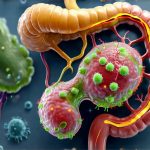Smoking is often associated with respiratory illnesses like lung cancer and emphysema, but its detrimental effects extend far beyond the lungs. Many people are unaware of the significant impact smoking has on the entire digestive system, from the mouth down to the colon. This widespread influence arises from various mechanisms, including altered motility, increased acid production, and compromised immune function within the gastrointestinal tract. Understanding these connections is crucial for appreciating the full scope of health risks associated with tobacco use.
The digestive system is a complex network responsible for breaking down food, absorbing nutrients, and eliminating waste. Smoking interferes with each stage of this process in subtle but substantial ways, potentially leading to a range of digestive disorders and discomforts. While quitting smoking offers numerous health benefits, recognizing the specific ways it affects digestion can provide further motivation for those considering making lifestyle changes.
The Mouth & Esophagus: First Line of Impact
The digestive journey begins in the mouth, where chewing initiates food breakdown. Smoking compromises oral health, reducing saliva production and increasing susceptibility to gum disease and oral cancers. These conditions directly interfere with efficient chewing and swallowing. Further down, the esophagus can be affected by increased acid reflux, a common consequence of smoking which weakens the lower esophageal sphincter.
Smoking also alters taste perception, making food less enjoyable and potentially leading to poor dietary choices. This is due both to damage to taste buds and overall changes in how the brain processes taste signals.
Systemic Effects & Digestive Health
The negative effects of smoking aren’t limited to direct contact within the digestive tract; they extend systemically, influencing overall health and exacerbating digestive issues. Nicotine, a key component of tobacco, constricts blood vessels throughout the body, reducing blood flow to vital organs including those involved in digestion. This reduced circulation impacts nutrient absorption and impairs healing processes.
Acid Reflux & GERD
Smoking is strongly linked to gastroesophageal reflux disease (GERD) and heartburn. Nicotine weakens the lower esophageal sphincter, allowing stomach acid to flow back up into the esophagus. Additionally, smoking stimulates gastric acid production, increasing the amount of corrosive substance available for reflux. This constant exposure can damage the esophageal lining, leading to chronic inflammation and discomfort. It’s important to note that GERD isn’t just about heartburn; it can also manifest as respiratory problems like chronic cough or asthma-like symptoms due to acid aspiration.
Peptic Ulcers & Gastritis
Smoking significantly increases the risk of developing peptic ulcers – sores in the lining of the stomach, duodenum, and esophagus. While Helicobacter pylori infection is a primary cause of most ulcers, smoking impairs ulcer healing and makes individuals more susceptible to recurrence. It also damages the protective lining of the stomach, making it vulnerable to acid damage leading to gastritis (inflammation of the stomach lining). The combination of increased acid production, weakened esophageal sphincter, and impaired healing contributes to this heightened risk.
Inflammatory Bowel Disease & Colon Health
Research suggests a strong correlation between smoking and an increased risk of developing Crohn’s disease, although it has a protective effect against ulcerative colitis (a different form of IBD). The mechanisms behind these seemingly contradictory effects are complex and not fully understood. Smoking alters the gut microbiome, potentially disrupting the delicate balance of bacteria necessary for healthy digestion and immune function. In relation to colon health specifically, smoking increases the risk of developing colorectal cancer and polyps. These risks arise from a combination of factors including exposure to carcinogens in tobacco smoke, altered bowel motility, and compromised immune surveillance within the colon.
Smoking’s impact on digestion is far-reaching and multifaceted. It isn’t simply about direct irritation or damage; it involves complex interactions between nicotine, the digestive system, and overall health. Recognizing these connections underscores the importance of avoiding smoking for optimal digestive wellbeing and general health. Quitting smoking, even after many years, can significantly improve digestive function and reduce the risk of related complications. Seeking support from healthcare professionals and utilizing cessation resources are valuable steps towards a healthier lifestyle.


















